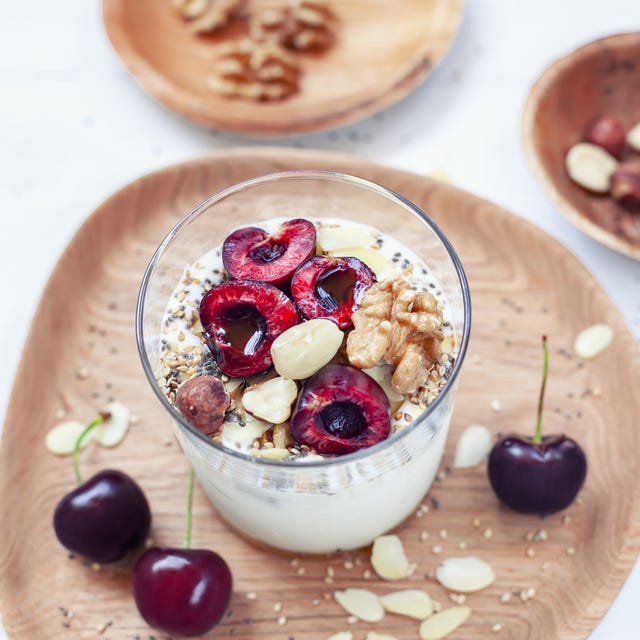Chronic inflammation can derail your performance and health. Add these foods to your plate to tame it.

MAIKA 777//Getty Images
After a long run or hard track workout, you may feel sore and tired. In many ways, these are signs of a job well done. Tough training sessions produce micro-tears in your muscles, leading to inflammation that signals your muscles to repair themselves and get stronger.
While a short period of inflammation benefits your performance, research ties chronic inflammation to heart disease, dementia, diabetes, and more health conditions. One of the best ways to tame inflammation? Adding anti-inflammatory foods to your plate.
“Whether you run to perform or just run for the enjoyment of the sport, mitigating chronic inflammation is important,” Jamie Lee McIntyre, RDN, a sports dietitian who works with clients in Connecticut, New York, and Florida, tells Runner’s World. “A diet rich in anti-inflammatory foods will help you achieve that.”
Read on to learn about the foods that fight inflammation, the best time to eat them, plus what foods to avoid.
How Foods Fight Inflammation
The good news for runners is that foods that help reduce inflammation often do double duty: While lowering inflammation, they also promote overall health and longevity. They’re high in fibre, full of antioxidants, healthy fats, and vitamins and minerals—all healthful properties you want in your diet to keep you feeling your best, especially as you’re clocking miles.
In fact, a 2023 systematic review published in Nutrition Reviews found that diet can play a role in reducing inflammatory markers in the body, and researchers point to the Mediterranean diet as a solid option for offering this benefit, especially when adopting components of it like eating nuts, fish, and olive oil.
As with all healthy diets, when sticking with foods that fight inflammation, think about eating bright, colorful, plant-based foods that pack a powerful combination of nutrients. “Anti-inflammatory foods are generally healthy foods, period,” says Becky Ramsing, R.D., M.P.H., senior program officer with the Food Communities and Public Health Program at Johns Hopkins Center for a Livable Future. “Everyone needs to eat this way, but runners ask a lot of their bodies, so it’s even more important to include these foods.”
Ramsing adds that the more you demand of your body, the more you should demand of your nutrition, too. “Ask yourself where you can add more [healthful foods],” she says. “If you’re cooking spinach, for instance, throw some extra in there.”
7 Foods That Fight Inflammation
- Colorful vegetables: Kale, spinach, broccoli, and sweet potatoes, all contain carotenoids, shown to reduce inflammation.
- Tart cherry juice: Research shows this drink can increase repair activity, reduces inflammation and oxidative stress.
- Oily fish: Salmon, tuna, anchovies, sardines, and mackerel are full of omega-3 fatty acids, which science associates with lowering inflammation, among other healthful benefits.
- Nuts and seeds: Pumpkin seeds, almonds, pistachios, and walnuts, are rich in unsaturated fatty acids, vitamins, and antioxidants, as well as those coveted anti-inflammatory properties.
- Fruits: These pack tons of disease-fighting nutrients, especially berries and citrus, the latter of which is flush with vitamin C, an antioxidant shown to reduce inflammation.
- Healthy oils: Olive, avocado, walnut and flaxseed, also help reduce inflammatory markers.
- Turmeric: This spice is a major source of the polyphenol (or plant micronutrient) known as curcumin, has been associated with reduced inflammation in the body.
McIntyre recommends not sweating the small stuff when it comes to your intake of these foods. “Rather than clocking every gram of nutrients you’re eating, just look at your plate,” she suggests. “Aim for half a plate of vegetables, a quarter protein and a quarter starch, plus healthy snacks. If you’re training really hard, maybe increase the carbohydrate portion,” she says.
Also, make it convenient to incorporate foods that fight inflammation into your day by planning ahead. “Runners have full days, so it helps to have these foods on hand and plan your meals in advance,” says Ramsing. “Do a pantry and refrigerator assessment and make it convenient to eat this way.”
When to Eat Foods That Fight Inflammation
“While it’s ideal to eat these foods within about 30 minutes of a workout, it’s more important to include them in every meal or snack,” says McIntyre. “But you do want to think about their fibre content if you’re eating them before a run.”
If you’re someone who tends to experience GI upset, try to avoid eating these powerhouses before heading out for your run. Or eat them at least three hours prior to your run, says McIntyre. “These are foods that take longer to digest, so test them out to see what your threshold is,” she adds.
Food to Avoid That Boost Inflammation
Just like some foods reduce inflammation in the body, others promote it. Those foods include refined starches, such as white bread, waffles, pastries, and processed cereals, which also come with a dose of trans or saturated fats. “Look at labels and avoid anything with partially hydrogenated fats,” says McIntyre.
Also steer clear of sugars like candy, cakes, and other sweet treats that can also promote inflammation.
While runners need plenty of protein, try to limit red meat and processed meats as your primary source of protein since they are high in saturated fat that can cause inflammation. Instead, go for lean chicken and fatty fishes.
Foods that reduce inflammation aren’t a cure-all for your health, but they should be a part of your everyday diet. “These are not miracle cures, but they will support you and your running,” says Ramsing. “It’s all about boosting intake of these foods in your diet wherever you can.”